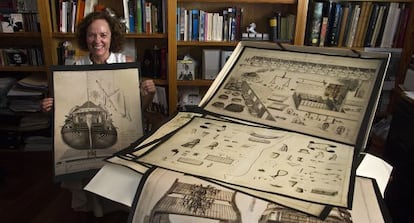"I hope Odyssey has learned its lesson over treasure"
Canadian researcher delighted at Spanish triumph in legal battle

Victoria Stapells breathed a sigh of relief earlier this year when two Hercules planes took off from the MacDill air force base in Tampa, Florida, with the treasure of La Mercedes onboard.
It was February 24 and Spain had finally won the five-year legal battle against the treasure-hunting firm Odyssey to gain ownership of 594,000 coins.
The gold from the Spanish warship, sunk in a battle in 1804, came back to Spain, and Stapells felt she could turn the page on five complicated years in her life.
The Canadian researcher, who has Spanish nationality and has worked with Spanish official agencies since she came to Seville in 1976, had been hired by Odyssey in 2006 to gather from the archives all the information she could find on several vessels sunk in different places, including the Nuestra Señora de la Mercedes.
"My contact with the company had told me they wanted the information to make documentaries. I never thought they would go after the treasure, and try to take it out through Gibraltar in the middle of the night," says Stapells in her study in Seville, a nook where half the shelves are given over to historical material and the other half to her passion for opera.
When Stapells saw the news of the treasure's discovery, on May 19, 2007, she saw she had stepped into a problem. She soon received a call from the Civil Guard, who were investigating the case. Odyssey tried to prevent her from talking to them. "They offered to take me out of the country, and threatened me with a lawsuit for breaking the confidentiality contract," says Stapells.
I never thought they'd try to take the treasure out through Gibraltar in the night"
She turned over to the police all the information she had gathered for Odyssey. Soon afterward, her sworn statement helped Spain's lawyers to defend in the Tampa court the claim that Odyssey had always known the identity of the ship called "Black Swan," the code name the company had given to the find.
Stapells also stated she had informed the company that it was a king's ship of historical importance for Spain.
"I was ill at ease throughout the duration of the case. I have been living here a long time; my two children live here. I love this country. And suddenly, here I had given information to a company with which Spain had a problem."
Though more relaxed now that Spain has recovered the treasure, some questions arise: "What will happen now?" she asks in reference to the some 30 institutions that have requested the coins for their museums from the Culture Ministry.
She is also curious to know what has become of an extensive project that the Ministry assigned to her and a team of others, shortly after the Odyssey news broke.
"We had to compile files on all the shipwrecks of the colonial era, to catalogue the ships sunk off the Americas. We delivered three volumes on Cuba, Panama and Santo Domingo. I don't know what happened to the project. As far as I know, research has petered out."
This is the part that now worries the researcher most. Spain ought to know exactly what it has on the sea floor, to prevent further cases such as the La Mercedes.
"To protect it, you have to know what it is that we have. And to that end, research in archives and libraries is indispensable," she says.
The Odyssey/La Mercedes story ended well for Stapells and for the interests of the Spanish government, which fought stubbornly for the return of the treasure. Odyssey was the loser.
Its prospects of finding other Spanish treasures are poor and, in view of judicial rulings, many of its business practices are under a shadow. "I hope they have also learned a lesson, and that if they go on hunting for treasure, they will do so with the agreement of the governments who lost their ships," she concludes.
Tu suscripción se está usando en otro dispositivo
¿Quieres añadir otro usuario a tu suscripción?
Si continúas leyendo en este dispositivo, no se podrá leer en el otro.
FlechaTu suscripción se está usando en otro dispositivo y solo puedes acceder a EL PAÍS desde un dispositivo a la vez.
Si quieres compartir tu cuenta, cambia tu suscripción a la modalidad Premium, así podrás añadir otro usuario. Cada uno accederá con su propia cuenta de email, lo que os permitirá personalizar vuestra experiencia en EL PAÍS.
¿Tienes una suscripción de empresa? Accede aquí para contratar más cuentas.
En el caso de no saber quién está usando tu cuenta, te recomendamos cambiar tu contraseña aquí.
Si decides continuar compartiendo tu cuenta, este mensaje se mostrará en tu dispositivo y en el de la otra persona que está usando tu cuenta de forma indefinida, afectando a tu experiencia de lectura. Puedes consultar aquí los términos y condiciones de la suscripción digital.








































